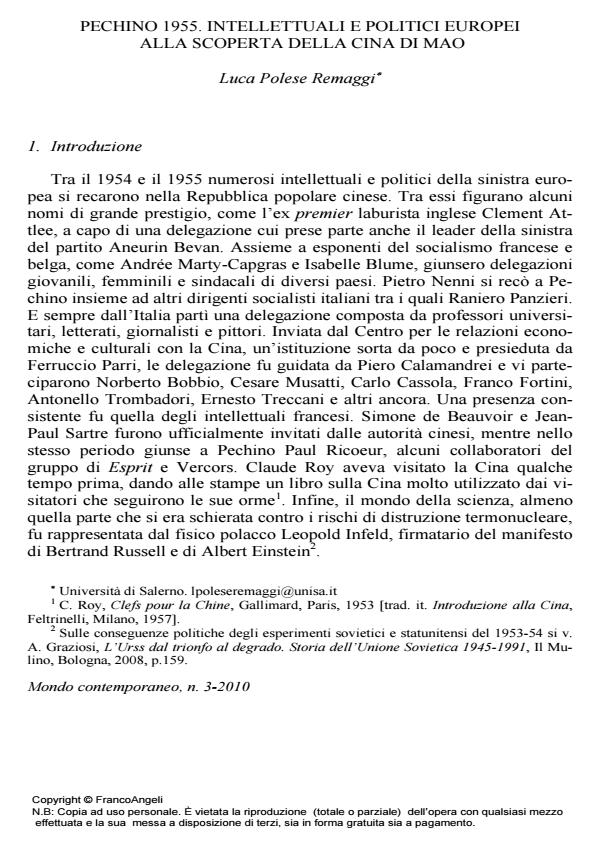Beijing 1955. European Intellectuals and Politicians Discovering Mao’s China
Journal title MONDO CONTEMPORANEO
Author/s Luca Polese Remaggi
Publishing Year 2011 Issue 2010/3
Language Italian Pages 35 P. 55-89 File size 591 KB
DOI 10.3280/MON2010-003003
DOI is like a bar code for intellectual property: to have more infomation
click here
Below, you can see the article first page
If you want to buy this article in PDF format, you can do it, following the instructions to buy download credits

FrancoAngeli is member of Publishers International Linking Association, Inc (PILA), a not-for-profit association which run the CrossRef service enabling links to and from online scholarly content.
This essay focuses on groups of European intellectuals (mainly French and Italians) traveling to revolutionary China in 1955. The move toward Mao’s regime followed the invitation that Prime Minister Zhou Enlai had addressed to the world public opinion during the Bandung Conference. His message («come and see») was received enthusiastically by intellectuals feeling at odds with the Cold War politics in Europe. The author points out that the emergence of the new Communist regime stimulated in the political discourse the image of a third way both revolutionary and democratic. The Chinese authorities dealt with visitors by following the rules that Mao had established during the Long March: «Security, secrecy, friendliness and red guides». The travelers’ willing to believe make the authorities’ job easier. The author shows how most of the travelers brought back home the positive image of a State-party, eager to eradicate poverty and backwardness. He also discusses the reasons why just a few of them worried about the violation of civil rights and liberties, whereas the U. S. liberals were shaping the notion of Totalitarianism also by taking into account the emergence of the Chinese communist regime.
Keywords: Intellectuals, Third way, Chinese revolution, fellow travellers, political pilgrimage, Bandung conference
- Cultural Mobilities Between China and Italy Linetto Basilone, pp.37 (ISBN:978-3-031-39258-0)
- "Cina d'oggi" e Guerra fredda nella politica estera italiana: il Centro studi per lo sviluppo delle relazioni economiche e culturali M. Lorenzo Capisani, in ITALIA CONTEMPORANEA 289/2019 pp.40
DOI: 10.3280/IC2019-289002
Luca Polese Remaggi, Pechino 1955. Intellettuali e politici europei alla scoperta della Cina di Mao in "MONDO CONTEMPORANEO" 3/2010, pp 55-89, DOI: 10.3280/MON2010-003003